|
|
|
Sort Order |
|
|
|
Items / Page
|
|
|
|
|
|
|
| Srl | Item |
| 1 |
ID:
137640
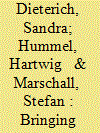

|
|
|
|
|
| Summary/Abstract |
Referring to Kant’s ‘Perpetual Peace’, research on the democratic peace is based on the assumption that citizens’ preferences are fully and directly transferred into actual security policy by democratic leaders. However, democratic responsiveness in foreign politics is a more complex issue. Parliaments are usually key institutions with regard to ensuring responsiveness of democratic leaders both by authorizing political decisions and by monitoring executive policymaking and implementation. However, in several democracies military security policy-making is understood as part of an ‘executive prerogative’. This article examines the role of parliaments in providing for democratic responsiveness of security policy-making. We test the hypothesis that, depending on the extent of their ‘war powers’, parliaments do effectively limit the scope of executive security policy if and when public opinion strongly opposes military action. The decision-making of 25 European democracies on military participation in the 2003 Iraq War serves as a test. Testing the hypothesis we find that countries with strong parliamentary war powers tended to be significantly less involved in the military intervention against Iraq. However, several puzzles of a theory of ‘parliamentary peace’ remain to be addressed by future research.
|
|
|
|
|
|
|
|
|
|
|
|
|
|
|
|
| 2 |
ID:
137636
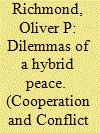

|
|
|
|
|
| Summary/Abstract |
Hybrid forms of peace represent a juxtaposition between international norms and interests and local forms of agency and identity. A first stage may be tense forms of hybrid politics that maintain structural violence, fail to resolve the contradictions between local and international norms, and reflect the outsourcing of colonial style rule. This could be characterised as, or lead to, a negative form of hybrid peace. A positive form of hybrid peace would have the advantage of having resolved such contradictions through active rather than passive everyday agency. This article examines this range of dilemmas surrounding debates about hybrid peace.
|
|
|
|
|
|
|
|
|
|
|
|
|
|
|
|
| 3 |
ID:
137633
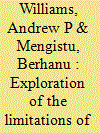

|
|
|
|
|
| Summary/Abstract |
This article seeks to unpack the implications of contemporary peacebuilding for technocratic, bureaucratic organizational forms. It argues that if the contemporary peacebuilding literature is taken as given, fundamental alterations are required in predominately Western peacebuilding systems—specifically in the structure and function of bureaucratic organizations that typically fund, manage and execute peacebuilding interventions. The analysis proceeds by matching five ‘peacebuilding principles’ derived from contemporary literature, with an organizational framework that highlights key structural and functional aspects of bureaucracies, thus allowing organizational deficiencies to be identified. The article argues that current peacebuilding scholarship would benefit from theoretically guided organizational research on the various organizations and systems involved in peacebuilding implementation. It concludes that peacebuilding scholars can be informed by the significant body of knowledge in the fields of public administration and policy, which bring a rich history of studying implementation situations that parallel in many ways complex peacebuilding interventions.
|
|
|
|
|
|
|
|
|
|
|
|
|
|
|
|
| 4 |
ID:
137643
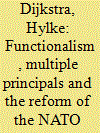

|
|
|
|
|
| Summary/Abstract |
The literature on international organizations tells us that diverging member states’ preferences and concerns about the loss of control are major obstacles to institutional reform. But what if changes in the international environment necessitate institutional reform? This article examines such dilemma in the case of the North Atlantic Treaty Organization (NATO). NATO has faced functional pressures to adjust its machinery to the post-Cold War era, but has at the same time seen its membership and the preference heterogeneity of the membership increase. The article finds that institutional change is indeed difficult with multiple principals and uncertainty about the consequences of reform. Yet modest reform has still taken place. Firstly, strong functional pressures can help the member states to overcome their differences concerning institutional reform. Secondly, lower-level incremental reforms, beyond the control of the member states, have made NATO a more efficient organization. The empirical focus is on the development of the understudied International Staff post-1989.
|
|
|
|
|
|
|
|
|
|
|
|
|
|
|
|
| 5 |
ID:
137634
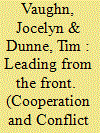

|
|
|
|
|
| Summary/Abstract |
The United States has historically been inconsistent and ambivalent about the responsibility to protect. Part 1 of the article sets out a theoretical framework for understanding how the United States aligns itself with the responsibility to protect; it does so by initially using the idea of norm localisation, which reveals important convergences and tensions between the international norm and the localised variant that we call ‘genocide and mass atrocity prevention/protection’. Part 2 looks at the impact of this norm innovation in relation to the position that the United States government adopted on Libya – suggesting that it played a critical leadership role in the crisis and in doing so took risks with its international reputation while knowing that there was little prospect that this action would be warmly greeted by Congress or domestic public opinion.
|
|
|
|
|
|
|
|
|
|
|
|
|
|
|
|
| 6 |
ID:
137638


|
|
|
|
|
| Summary/Abstract |
In recent years, policebuilding has moved centre stage in international security. Not only have the numbers of police officers deployed externally significantly increased in the last decade, but the police have also come to be regarded as key with regard to the stabilizing of weak or failed states. It is hereby assumed that the police, as a civilian force, are better trained and equipped to establish order and stability than the military. This article challenges such a military–police divide, according to which the police are understood to be a civilian institution that mainly ‘serves and protects’ while the military ‘breaks things and kills people’. It argues that while the blurring between military functions and police functions might be more bleak and observable as part of international interventions in so-called zones of disorder, we need to understand the police theoretically as part of a single continuum of state institutions designed to simultaneously serve and protect the population and to establish and maintain liberal state power through (sometimes) forceful, exclusionary means. The article will illustrate this theoretical argument through a detailed analysis of the evolution of European Union international police power.
|
|
|
|
|
|
|
|
|
|
|
|
|
|
|
|
| 7 |
ID:
137645


|
|
|
|
|
| Summary/Abstract |
The literature on norm socialization and Europeanization has largely focused on successful norm diffusion, but thus far it has hardly addressed the norm backlash from the respective societies. To more fully grasp the interaction between member states’ roles and their institutional preferences we provide a conceptual model for the de-composition of national role conceptions. This model is applied in case studies on German and Czech European policies in the constitutionalization process of the European Union. The paper illustrates how the composition of Czech and German roles has changed over time and how these national role conceptions shape the countries’ respective institutional preferences. We conclude that historical role experience is considered as a powerful explanatory tool for the policies of today’s European Union member states.
|
|
|
|
|
|
|
|
|
|
|
|
|
|
|
|
| 8 |
ID:
137642
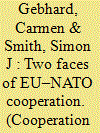

|
|
|
|
|
| Summary/Abstract |
Maritime engagement in the Gulf of Aden is a puzzling case for anyone interested in the political and institutional problems underlying European Union–North Atlantic Treaty Organization (EU– NATO) cooperation. Although the EU’s operation NAVFOR ‘Atalanta’ and NATO’s ‘Ocean Shield’ operate in the same theatre and with similar mandates, there is no formal link between them. No joint planning has been envisaged, and no official task-sharing takes place. As this article aims to show, cooperation and coordination between EU and NATO forces at the operational and tactical levels have nevertheless worked surprisingly well. Two faces of EU–NATO cooperation become apparent: the political level is dominated by a permanent deadlock, while on the ground and at sea staff have developed a modus operandi that allows them to deliver fairly successfully in complementing yet detached operations. Based on 60 interviews with EU and NATO officials (2010–2013), this article illustrates how the operational and tactical levels have developed ways of coordinating efforts informally despite the lack of a formal framework. It aims to show to what extent and how they succeed at bypassing organizational boundaries and at overcoming political limitations. Although these practices are becoming increasingly institutionalized, it remains to be seen whether this will translate into formal changes.
|
|
|
|
|
|
|
|
|
|
|
|
|
|
|
|
|
|
|
|
|